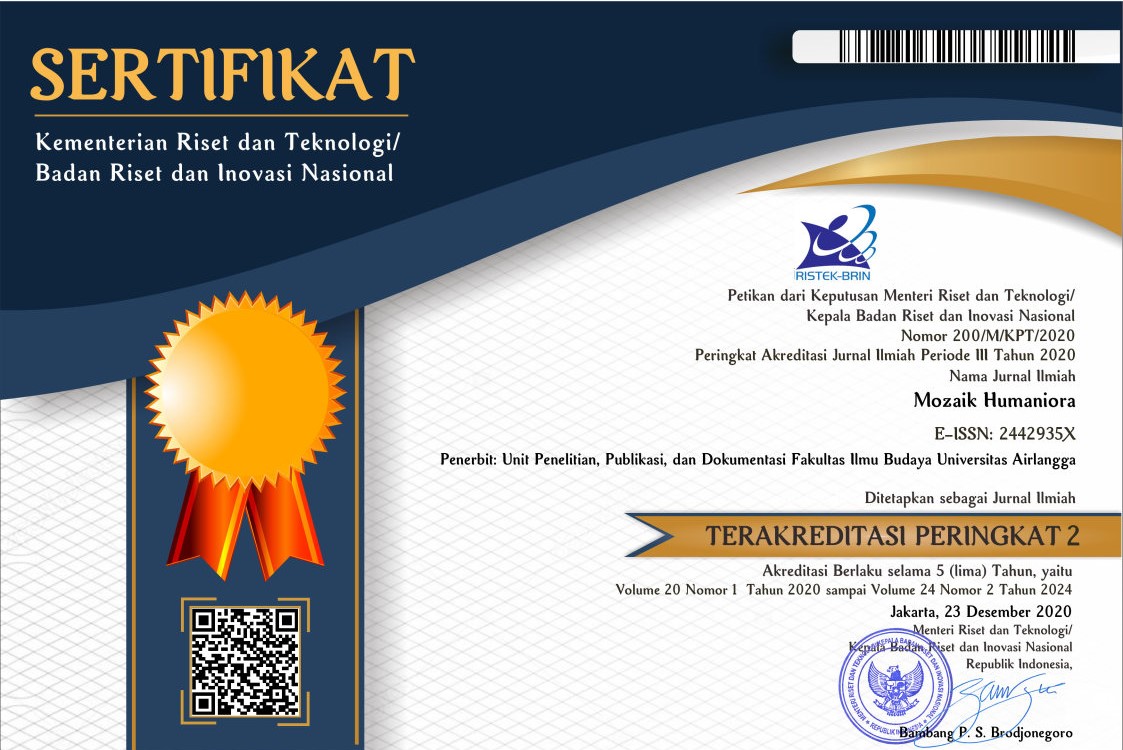Food Metaphor in Jhumpa Lahiri's The Lowland
Downloads
As food is now also observed through the lens of social sciences, the relation of food and literature is inevitable. In diasporic identity, the existence of food as one of the elements that immigrants usually long for is thus unavoidable. This paper discusses the metaphor of food and foodways in the novel The Lowland by Jhumpa Lahiri. Through postcolonial analysis, the results show that food and foodways metaphorically represent nostalgia experienced by the main character. Food also becomes the field of showing identity, and negotiation process which bridges the binary cultural differences. Moreover, Lahiri also implies the metaphor of food as the oppression of women due to the existence of patriarchal values in the old world. Domesticity symbolized through food and foodways puts women in an uneasy situation. Lahiri also parallels the food as the medium of the old and new world: the poor and sufficiency, and the resistance to capitalism.
Keywords : Food, nostalgia, identity, oppression, binary opposition
Barthes, Roland. 1967. Elements of Semiology. New York: Hill and Wang.
Hall, Stuart. 2003. "Cultural Identity and Diaspora.” Theorizing Diaspora, 233–47. http://www.dartmouth.edu/~grid/events/hall2003_culturalidentityanddiaspora.pdf.
Holtzman, Jon D. 2006. "Food and Memory.” Annual Review of Anthropology 35: 361–78. http://www.jstor.org/stable /25064929.
Keeling, Kara K, and Scott T Pollard. 2009. Critical Approaches to Food in Children Literature. New York: Routledge. Library Genesis.
Kessler, Brad. 2005. "One Reader's Digest: Towards a Gastronomy Theory of Literature.” The Kenyon Review. 27 No.2: 148–65. http://www.jstor.org/stable/4338738.
Lahiri, Jhumpa. 2009. "Rice.” http://www.newyorker. com/magazine/2009/ 11/23/rice-2.
———. 2013. The Lowland. New York: Vintage Book.
———. 2015. "Indian Takeout.” http://www.foodandwine.com/articles/indian-takeout.
———. 2016. "Jhumpa Lahiri: ‘I Am, in Italian, a Tougher, Freer Writer.'” https://www.theguardian.com/books/2016/jan/31/jhumpa-lahiri-in-other-words-italian-language.
Lyotard, Jean Francois. 1984. The Postmodern Condition: A Report on Knowledge. Minneapolis: University of Minnesota.
Mannur, Anita. 2010. Culinary Fiction: Food in South Asian Diasporic Culture. Philadelphia: Temple University Press.
Montanari, Massimo. 2004. Food Is Culture. New York: Columbia University Press.
Supriyono, J. 2004. "Mencari Identitas Kultur Keindonesiaan.” In Hermeneutika Pascakolonial: Soal Identitas, edited by Mudji Sutrisno and Hendar Putranto, 139–53. Yogyakarta: Kanisius.
Sutton, David E. 2001. Remembrance of Repasts: An Anthropology of Food and Memory. Oxford: Berg.
Vertovec, Steven. 1999. "Three Meanings of ‘Diaspora', Exemplified among South Asian Religions,” no. University of Oxford: 1–23. www.transcomm.ox.ac.uk /working paper/diaspora.pdf.
Whitt, Jennifer Burcham. 2011. "An Appetite for Metaphor: Food Imagery and Cultural Identity in Indian Fiction.” Master's thesis. East Carolina University.

Mozaik Humaniora is licensed under a Creative Commons Attribution-ShareAlike 4.0 International License. Both authors and Mozaik Humaniora agree with the following attribution of journal:
1. Copyright of this journal is possession of Author, by the knowledge of the Editorial Board and Journal Manager, while the moral right of the publication belongs to the author.
2. The journal allows the author(s) to retain publishing rights without restrictions
3. The legal formal aspect of journal publication accessibility refers to Creative Commons Attribution Share-Alike (CC BY-SA).
4. The Creative Commons Attribution Share-Alike (CC BY-SA) license allows re-distribution and re-use of a licensed work on the conditions that the creator is appropriately credited and that any derivative work is made available under "the same, similar or a compatible license”. Other than the conditions mentioned above, the editorial board is not responsible for copyright violation.


















